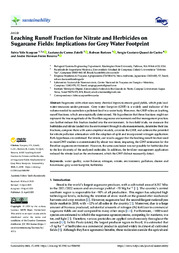Leaching runoff fraction for nitrate and herbicides on sugarcane fields: implications for grey water footprint.
Leaching runoff fraction for nitrate and herbicides on sugarcane fields: implications for grey water footprint.
Author(s): SCARPARE, F. V.; ZOTELLI, L. do C.; BARIZON, R. R. M.; CASTRO, S. G. Q. de; BEZERRA, A. H. F.
Summary: Abstract: Sugarcane cultivation uses many chemical inputs to ensure good yields, which puts local water resources under pressure. Grey water footprint (GWF) is a widely used indicator of the volume needed to assimilate a pollutant load in a water body. However, the GWF relies on leaching runoff fractions, which are empirically determined. We hypothesize that these fractions might not represent the true magnitude of the Brazilian sugarcane environment and that management practices can further reduce this fraction loaded into the environment. In two field trials, we measure the herbicides and nitrate loaded into the environment through in situ measurements, determine their loss fractions, compare them with some empirical models, calculate the GWF, and estimate the potential for nitrate pollution attenuation with the adoption of split and incorporated nitrogen application. Both hypotheses are confirmed. For nitrate, our results suggest that the leaching runoff fraction used in most GWF studies is overestimated by about two times, impacting the GWF estimation for the Brazilian sugarcane environment. However, the same conclusion was not possible for herbicides due to the low diversity of the analyzed molecules. In addition, the fertilizer management application reduced the nitrate load on the environment, which the GWF did not necessarily detect.
Publication year: 2023
Types of publication: Journal article
Unit: Embrapa Environment
Observation
Some of Embrapa's publications are published as ePub files. To read them, use or download one of the following free software options to your computer or mobile device. Android: Google Play Books; IOS: iBooks; Windows and Linux: Calibre.
Access other publications
Access the Agricultural Research Database (BDPA) to consult Embrapa's full library collection and records.
Visit Embrapa Bookstore to purchase books and other publications sold by Embrapa.

